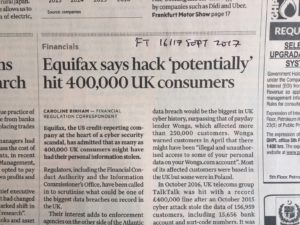I’m reading Philip Mirowski’s Never Let A Serious Crisis Go to Waste: How Neoliberalism Survived the Financial Meltdown. In Chapter 1 he reflects on the curious fact that nothing much changed as a result. “The strangest thing”, he writes,
was that instead of leading to a collapse of the right-wing neoliberalism that had enabled the catastrophe to happen, the crisis actually seemed to strengthen the Right. It took a rare degree of self-confidence or fortitude not to gasp dumbfounded at the roaring resurgence of the right so soon after the most catastrophic global economic collapse after the Great Depression of the 1930s. “Incongruity” seems too polite a term to describe the unfolding of events; “contradiction” seems too outmoded. Austerity became the watchword in almost every country; governments everywhere became the scapegoats for dissatisfaction of every stripe, including that provoked by austerity. In the name of probity, the working class was attacked from all sides, even by nominal “socialist” parties… The pervasive dominance of neoliberal doctrines and right-wing parties worldwide from Europe to North America to Asia has flummoxed left parties that, just a few short years ago, had been confident they had been finally making headway after decades of neoliberal encroachment. Brazenly, in many cases parties on the left were unceremoniously voted out because they had struggled to contain the worst fallout from the crisis. By contrast, the financial institutions that had precipitated the crisis and had been rescued by governmental action were doing just fine — nay, prospering at pre-crisis rates — and in a bald display of uninflected ingratitude, were intently bankrolling the resurgent right. Indeed, the astounding recovery of corporate profits practically guaranteed the luxuriant post-crisis exfoliation of Think Tank Pontification. nationalist proto-fascist movements sprouted in the most unlikely places, and propounded arguments bereft of a scintilla of sense. “Nightmare” did not register as hyperbolic; it was the banjax of the vanities.
That’s just about the most succinct expression of the bewilderment that most of us felt — or certainly that I felt as I watched the UK post-crisis, Tory-led coalition government blaming the populace (or its Labour predecessor) for the debacle, and imposing ‘austerity’ as the punishment for popular irresponsibility rather than as the price of forcing the public to shoulder the costs of bankers’ greed and recklessness. And it’s why I always thought that, eventually, the penny would drop with electorates, and why the current ways of populist anger towards ‘elites’ comes as no surprise. In fact the only surprising thing about it is that it took so long to materialise.
Mirowski also picks up the strange inability of the left to pin the blame where it belonged: the financial services industry and the feeble regulatory regimes under which the madness and greed of the sector burgeoned. Here, for example, is Ezra Klein reviewing Inside Job, a documentary that made an admirable stab at naming names and fingering culprits. What made the financial crisis so scary, Klein wrote, was that
The complexity of the system far exceeded the capacity of the participants, experts and watchdogs. Even after the crisis happened, it was devilishly hard to understand what was going on. Some people managed to connect the right dots, in the right ways and at the right times, but not so many; and not through such reproducible methods, that it’s clear how we can make their success the norm. But it is clear that our key systems are going to continue growing more complex, and we’re not getting any smarter.
The fact that (as Mirowski points out) some commentators normally seen as left-of-centre felt obliged to attack the documentary is itself significant. It’s a symptom of how far the ice of neoliberalism has penetrated the radical soul. Less abstractly, it confirms my own working definition of ‘ideology’ as the force that determines how you think even when you don’t know you’re thinking. Klein’s hapless defeatism also echoes the feeble answer eventually provided by the British Academy to the question posed by the Queen to the luminaries of the LSE at the height of the crisis: why had none of those besuited, learned gents in the receiving line seen the catastrophe coming?
But against those who warned, most were convinced that banks knew what they were doing. They believed that the financial wizards had found new and clever ways of managing risks. Indeed, some claimed to have so dispersed them through an array of novel financial instruments that they had virtually removed them. It is difficult to recall a greater example of wishful thinking combined with hubris. There was a firm belief, too, that financial markets had changed. And politicians of all types were charmed by the market. These views were abetted by financial and economic models that were good at predicting the short-term and small risks, but few were equipped to say what would happen when things went wrong as they have. People trusted the banks whose boards and senior executives were packed with globally recruited talent and their non-executive directors included those with proven track records in public life. Nobody wanted to believe that their judgement could be faulty or that they were unable competently to scrutinise the risks in the organisations that they managed. A generation of bankers and financiers deceived themselves and those who thought that they were the pace-making engineers of advanced economies.
All this exposed the difficulties of slowing the progression of such developments in the presence of a general ‘feel-good’ factor. Households benefited from low unemployment, cheap consumer goods and ready credit. Businesses benefited from lower borrowing costs. Bankers were earning bumper bonuses and expanding their business around the world. The government benefited from high tax revenues enabling them to increase public spending on schools and hospitals. This was bound to create a psychology of denial. It was a cycle fuelled, in significant measure, not by virtue but by delusion.
Among the authorities charged with managing these risks, there were difficulties too. Some say that their job should have been ‘to take away the punch bowl when the party was in full swing’. But that assumes that they had the instruments needed to do this. General pressure was for more lax regulation – a light touch. The City of London (and the Financial Services Authority) was praised as a paragon of global financial regulation for this reason.
Translation: It was all very complex, Ma’am. QED.
This is the resort to ‘complexity’ as an epistemological or ideological device. It’s a way of saying that some things are beyond analysis or explanation. Sometimes this is true: complex systems exist and they are inherently unpredictable and sometimes intrinsically incomprehensible. But a banking system run as a racket does not fall into that category.


